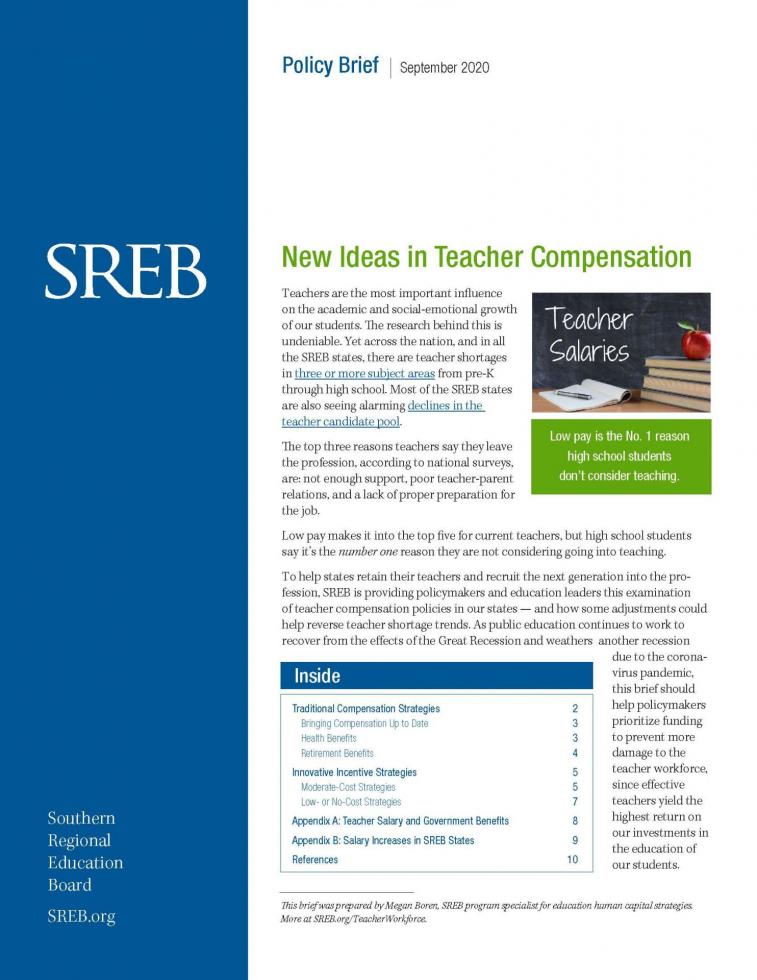Respect (and Pay) Our Teachers, Or Lose Them
 As state education budgets suffer during this pandemic, the teaching profession simply cannot absorb the kind of blow it took in the last recession. Teacher salaries dropped substantially then, and today, a decade later, they’re still lower on average than before the Great Recession. Morale has dropped, too, according to surveys, and turnover has risen as budgets and teacher supports decrease. We can’t afford to repeat the same mistakes in this current climate, another recession aggravated by COVID-19.
As state education budgets suffer during this pandemic, the teaching profession simply cannot absorb the kind of blow it took in the last recession. Teacher salaries dropped substantially then, and today, a decade later, they’re still lower on average than before the Great Recession. Morale has dropped, too, according to surveys, and turnover has risen as budgets and teacher supports decrease. We can’t afford to repeat the same mistakes in this current climate, another recession aggravated by COVID-19.
We’re seeing widespread teacher shortages, with declines in teacher-candidate enrollment and an upswell of retirements and resignations. In 2018 all 16 states in the SREB region faced shortages in at least three subjects.
The only way to attract tomorrow’s best educators, and to keep today’s, is to compensate them fairly.
How can we avert further damage to the teacher workforce with budgets under stress?
Some short-term strategies — emergency certifications, for instance — just worsen the problem. Inadequate preparation is one of the reasons nearly a quarter of the South’s teachers are unprepared, inexperienced, or planning to leave in the next five years.
The only way to attract tomorrow’s best educators, and to keep today’s, is to compensate them fairly. Low pay is the number one reason high school graduates offer for not considering a career in teaching. Teachers are educated and trained like their professional peers, but they are not paid like them.
It’s essential that states and schools begin a long-term overhaul of teacher pay, and that planning can start now. Abominably low state salary schedules based solely on years of experience and education or training convey the message that these are the only attributes of value. Teacher pay should include scheduled cost of living raises, and step increases should be reformed to reflect mastery of skills, competencies and effective instruction, rather than simply time served.
We should also start looking at compensation as more than traditional salary plus benefits, including retirement and health insurance.
For one thing, those forms of indirect compensation are expensive — nationwide, only five states have a fully funded pension plan — so enhancing them will not, by itself, relieve state budgets. Another reason to look beyond the pension? Newer teachers place more importance on salary than retirement, as they are less likely than earlier generations to stay in any career for 30 years.
We should think about a workplace culture focused on instruction, perhaps with more planning periods and smaller classes, one that values teachers for their unique training, skills and gifts.
Right now, there are still things we can do to show teachers that we recognize their worth. Some of the ways to do this are relatively low-budget, and some (like simple recognition and gratitude) cost nothing at all.
We need to discuss, along with salary schedules and investment profiles, such things as more generous personal leave and childcare; professional development and peer support groups; opportunities for exercise, mentoring and mindfulness. We should think about a workplace culture focused on instruction, perhaps with more planning periods and smaller classes, one that values teachers for their unique training, skills and gifts rather than as de facto nurses, counselors or mental health providers, as though all those professions were interchangeable.
We know that good teachers are essential: they’re estimated to have two to three times the effect on student learning of any other school factor, including services, facilities, even leadership. Every teacher makes a lifelong impression on thousands of students over the course of a career, helping create whole generations of productive, well-rounded adults.
In these rough budget times, some short-term strategies can show respect, help boost morale and retain some teachers in the short run. But only long-range thinking, and a compensation system that helps teachers improve and rewards them when they do, will head off the coming crisis in teacher quantity and quality. Otherwise we’ll lose good teachers now and potentially great ones later. We’ll rob our children of the education they deserve, and our country of the future we all deserve.
Explore the data
SREB has developed a new interactive teacher compensation dashboard to provide policymakers and educators with data on how teachers are compensated in the 16 SREB states. Users can explore the average salaries, health-insurance costs, retirement plans and the resulting take-home pay for teachers in each state.


